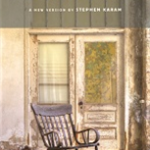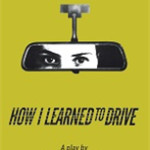- New from TCG
(Somerville, MA/NYC) Occasionally the New England Theatre Geek is invited to review plays. Theatre Communications Group (TCG) provides gratis paperback copies to NETG in exchange for objective reviews. The opinions stated here are not shared by TCG and are the author’s own.
Reviews by Kitty Drexel
Trigger warning: Liberal politics
Small Tragedy
By Craig Lucas
978-1-55936-507-9
PAPERBACK
144 pp
$15.95 USD
Small Tragedy uses a community theatre production Oedipus to remind us that even the people we think we know still contain mysteries. The reveal shocks the system in the way learning that 53% of white women voted for the clementine Dictator currently residing in the White House did: with quiet but realistic shock.
From the TCG website, a summary: “While rehearsing Oedipus, turbulent relationships between actors threaten to sabotage the production. As tensions grow stronger and hidden truths emerge, reality begins to emulate Oedipus in staggering ways. Lucas’s topical and complex play is a remarkably funny, sharply articulated missive about tragedy in the contemporary world.”
Small Tragedy can be read silently but requires a reading with actors to be fully comprehended. Characters speak over each other constantly (a la Caryl Churchill). Lucas is hiding important details that determine the big plot reveal in plain sight. Also, by overlapping the dialogue, Lucas gives us multiple character arcs within his play. We don’t have to choose who’s a lead or not. Everyone plays a major part.
This play requires a six person cast: 3 w, 3 m. The casting specifics are not detailed specifically by the playwright. A director will have to make decisions based on internet suggestions and a script reading.
Craig Lucas is a playwright, screenwriter and director of both theater and film. His plays include Prelude to a Kiss, The Dying Gaul, The Singing Forest, Small Tragedy, Reckless, Blue Window, Prayer for My Enemy, God’s Heart and the books for the musicals The Light in the Piazza, An American in Paris and Amélie.
Anton Chekhov’s The Cherry Orchard
A new version by Stephen Karam
From a literal translation by Allison Horsley
978-1-55936-551-2
PAPERBACK
120 pp
$14.95 USD
Karam’s interpretation of The Cherry Orchard is yet another in the recent spate of Chekhov interpretations. It’s the same story but through a literal translation by dramaturg Allison Horsley. This edition includes production history and little else.
Horsley is the more interesting contributor. She’s a Broadway dramaturg, literal translator for other Chekhov plays such as The Seagull, and an assistant professor at the University of Denver. She works regularly with the Oregon Shakespeare Festival. She’s had a fascinating career working with the theatre and translating plays from Russian into English for new productions of classics.
Stephen Karam is the author of two plays that were named finalists for the Pulitzer Prize for Drama: The Humans in 2016 and Sons of the Prophet in 2012. The Humans won the 2016 Tony Award for Best Play. His other work includes the play Speech & Debate and a film adaptation of Chekhov’s The Seagull for Sony Pictures Classics.
The Penitent
By David Mamet
978-1-55936-569-7
PAPERBACK
96pp
$14.95 USD
It is well known that Mamet doesn’t like actors or talkbacks after productions. The Penitent tells us that Mamet also doesn’t understand human emotions or personal responsibility. Maybe that’s why he doesn’t enjoy theatre unless it’s on his strict terms.
From the TCG website, a summary: “In David Mamet’s searing new drama, Charles, a psychiatrist, is thrown into a firestorm of controversy when he refuses to testify on behalf of a gay client accused of killing ten people. He claims his refusal is a principled defense of the Hippocratic oath, enshrining the confidentiality of the doctor-client relationship… The Penitent asks the question: What is the cost of standing up for what you believe?”
This play is about a rich man for whom basic concepts of morality are hard: Charles is an educated idiot who deflects responsibility in the name of client privilege. It’s a complete shock to him that his medical notes can be seized by the court. He’s again shocked when his loving middle aged lamp with a note of a wife leaves him, an emotionally constipated teenager in an old man’s body, for his immorality. Charles’ isn’t attacked for keeping quiet. He’s attacked for his moral bankruptcy.
The Penitent is poorly written. Mamet minces words to create a reality in which Charles behavior could be construed as just. Mamet/Charles avoids directly answering philosophical questions with real world application to keep the audience ignorant. Then, Mamet uses Charles’ point of view to prove to his audience that Charles’ is attacked by society for keeping sacred physician-patient privilege. Mamet is vague to prove to himself that he has a valid argument for The Penitent’s existence.
It should be noted that the client’s homosexuality is a plot device and nothing more.
David Mamet is a playwright, essayist and screenwriter who directs for both the stage and film. He was awarded the Pulitzer Prize for Glengarry Glen Ross. His other plays include American Buffalo, The Anarchist, Race, Speed-the-Plow, Oleanna and China Doll, among many others.
How I Learned to Drive
By Paula Vogel
978-1-55936-564-2
PAPERBACK
120pp
$14.95 USD
This play won the Pulitzer Prize for Drama in 1998. Vogel has never had a play run on Broadway. It could be that her plays don’t appeal to broader audiences, AND it could be sexism. There is no reason it can’t be both. Yet there is every reason to believe it is only sexism because Vogel’s plays do appeal to broad audiences. Every woman has met a man like Uncle Peck. I’ll bet there are quite a few men who do too. To say that How I Learned to Drive doesn’t have universal appeal because producers don’t want to investigate what makes a man become like Peck is disingenuous.
TCG now publishes this stand-alone edition of How I Learned to Drive. This 2018 edition includes a preface from Vogel. She addresses the current anti-woman political climate. If you haven’t read it, it’s a great reason to do so now.
Winner of the Pulitzer Prize for Drama, Paula Vogel’s How I Learned to Drive is widely recognized as a masterpiece of contemporary drama. It is published here for the first time as a stand-alone edition. Paula Vogel is the author of Indecent, The Baltimore Waltz, The Long Christmas Ride Home, Don Juan Comes Home from Iraq and A Civil War Christmas, among many other plays. She has held a distinguished career as a teacher and mentor to young playwrights, first at Brown University and then at the Yale School of Drama.




